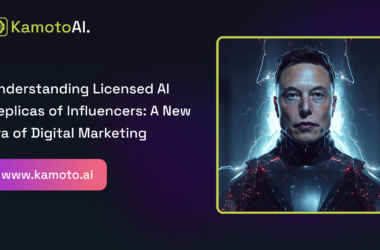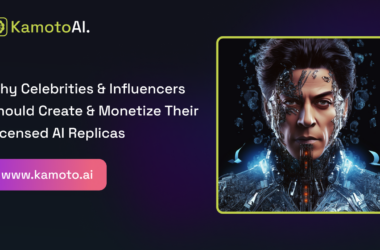Table of contents
- Introduction
- How does AI Replica of Celebrity work?
- Legal and Ethical Implications of Licensing AI Replica of Celebrity
- Benefits of Licensing AI Replica of Celebrity
- Limitations of Licensing AI Replica of Celebrity
- Future of AI Replica of Celebrity
- Conclusion
Introduction
We all have a celebrity crush, don’t we? Imagine having your favorite celebrity available for interaction, even after they pass away. It is now possible, thanks to Kamoto.AI, for the AI replicas of celebrities. Kamoto.AI uses data to create a virtual replica of a celebrity that is so real it can interact with fans. This new trend is gaining traction among fans and businesses who hunger for more celebrity interactions. This technology models the celebrity’s likeness and movements to create a realistic digital persona with which the public can engage. Let’s delve deeper into the nuances of AI replicas of celebrities and the growing trend of licensing them.
How does AI Replica of Celebrity work?
AI Replica of Celebrity is a technological marvel replicating a celebrity’s unique features and personality traits. The AI model of a celebrity can be used for various purposes, such as marketing, advertising, entertainment, and fan engagement. Developing an AI Replica of a Celebrity involves three essential processes: Data Collection, Data Production, and AI Modeling. The Data Collection process involves gathering data on a celebrity’s attributes, including visual, vocal, and behavioral patterns. This data can be derived from various sources such as social media, films, interviews, speeches, and concerts. The Data Production process involves converting the collected data into usable data formats that can be used for AI training. This process includes data sorting, filtering, and normalization. The AI Modeling process is the most crucial step in developing an AI Replica of a Celebrity. It involves using AI algorithms to analyze and process the collected and produced data. The AI models are trained to replicate the celebrity’s unique features, such as facial expressions, voice modulation, and behavioral patterns. This process involves generating a massive amount of data, which is used to train AI models through machine learning and deep learning techniques.
In conclusion, developing an AI Replica of Celebrity involves a complex data collection, production, and modeling process. It is an emerging trend in the entertainment world and has numerous potential applications. However, it also raises several legal and ethical concerns that must be addressed. With technological advancements, the future of AI Replica of Celebrity looks promising, but we should be mindful of its limitations and drawbacks.
Legal and Ethical Implications of Licensing AI Replica of Celebrity
As technology advances, so is the concept of licensing AI replicas of celebrities. This new trend is gaining traction, especially in the entertainment industry, to engage fans and market films and music content. However, it is essential to consider the legal and ethical implications of such replicas being created. Trademark and privacy laws are among the primary issues that must be considered. Trademark laws protect a celebrity’s name, image, and other aspects of personal branding.
On the other hand, privacy laws protect individuals against unauthorized use of their likeness, name, and other personal information. Licensing AI replicas may violate these laws and infringe on the original celebrity’s exclusive rights. Celebrities’ right to publicity is another issue arising with AI replicas’ creation. This right controls celebrities’ names and images for personal and commercial use. It can be challenging to balance this right with the push for technological advancements, especially in situations where an AI replica is licensed without the celebrity’s consent. Beyond the legal implications, licensing AI replicas may raise moral and social concerns. It is essential to consider the potential harm that could be done to the celebrity and their reputation, mainly if the AI replica is misused. Also, there is a risk that AI replicas could be used to mislead people or commit fraud on an unprecedented scale. Overall, licensing AI replicas of celebrities is a complex issue that raises important legal and ethical questions. As technology continues to advance, it is essential to place adequate moral and social safeguards in place to ensure that such replicas are not obtained and exploited unethically.
Benefits of Licensing AI Replica of Celebrity
One of the most significant benefits of licensing an AI replica of a celebrity is the newfound marketing and advertising opportunities it presents. Brands can now bring their favorite celebrities to endorse their products more personalized and engagingly. AI replicas can be programmed to speak in the star’s voice and even behave like them, which takes marketing to a new level. In the entertainment industry, AI replicas can bring back beloved celebrities who have passed away or become inactive. Fans can relive their favorite celebrity moments and experience the nostalgia of seeing their idols in action again.
Additionally, AI replicas can create entirely new content that would not have been possible with living celebrities. Another significant advantage of AI replicas is that they can improve fan engagement. Fans can interact with their favorite stars in ways that weren’t previously possible. For instance, fans can ask for customized shoutouts during a live event or even have a conversation with their AI replicas. This kind of fan interaction would undoubtedly boost the fan experience and create a more profound sense of loyalty. The potential applications of AI replicas are vast, but there are a few limitations. The risk of misuse and misrepresentation, technical constraints, and limited human touch are some of the issues that must be addressed. Despite these challenges, AI replicas remain a game-changer in the entertainment and marketing industry.
Limitations of Licensing AI Replica of Celebrity
Having an AI replica of a celebrity is undoubtedly a groundbreaking technology, but it has limitations. One of the key limitations is the risk of misuse and misrepresentation. With AI-powered replicas, anyone can manipulate and impersonate celebrities, which can threaten their reputation. Technical constraints are another limitation of licensing AI replicas. While technology has advanced significantly, replicating human-like experiences and emotions still has a long way to go. Currently, most AI replicas lack the human touch essential for building a connection with fans.
Moreover, AI replicas are limited in responding to unpredictable situations. The unpredictability factor might not work well in the entertainment industry, where most performances are spontaneous and real-time. Despite its limitations, the technology has enormous potential to revolutionize various industries. It’s up to the industry experts to address the limitations and harness the true potential of AI replicas.
Future of AI Replica of Celebrity
The future of AI Replicas of Celebrity seems bright with constant technological advancements. With improvements in machine learning, AI replicas can now perform a broader range of actions, from generating unique personalities to being able to recognize and respond to facial expressions. Potential applications for AI replicas of celebrities are diverse, ranging from personalized ads to enhancing the fan experience. Advertisers can use AI replicas to create targeted ads that resonate better with fans. Moreover, by using AI replicas in entertainment, fans can experience their favorite celebrities uniquely. Despite the vast potential, there are emerging legal and ethical issues surrounding AI replicas of celebrities. One key issue is data privacy, with replicas potentially collecting sensitive data such as facial expressions and voice samples. Additionally, questions about a celebrity’s right to publicity and how AI replicas may infringe on it have been raised. Overall, while AI replicas of celebrities offer unprecedented opportunities, it should be remembered that some ethical and legal frameworks exist around them.
Conclusion
To sum it up, licensing AI replicas of celebrities is a growing trend with significant potential in marketing, advertising, and entertainment. While it does have legal and ethical implications, the benefits of engaging fans with personalized experiences make it a worthwhile pursuit. The limitations of AI technology may pose a challenge, but with advancements on the horizon, the future is promising. As with all advancing technology, we must consider potential consequences and embrace the innovative opportunities presented to us.







